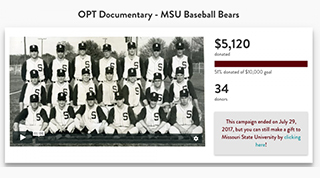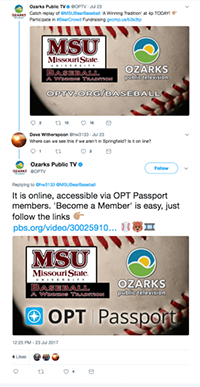Ozarks Public Television Combines Crowdfunding and Passport for Local Documentary

Ozarks Public Television Combines Crowdfunding and Passport for Local Documentary
At Ozarks Public Television, the MSU documentary used crowdfunding successfully to increase financial support, improve awareness, and fulfill its mission. Fans of the MSU Bears might call that a triple play.
The Challenge
Local programming is at the heart of the PBS mission, and documentaries are some of the favorite types of programs our member stations broadcast. Ozarks Public Television (OPT), based in Springfield, Missouri and a dual-licensee of Missouri State University, has for several years been producing documentaries that explore the history of the Ozarks region. Past documentary subjects have included the Ozark Air Lines, Route 66, and the Frisco Railroad.
When OPT began working on a documentary, directed by Steve Wynn, about the history of the Missouri State baseball team—a storied program with only two coaches in its 54 seasons—they soon realized its premiere was going to coincide with one of the team’s best years ever. In 2017, the MSU Baseball Bears advanced to the NCAA Super Regionals in Fort Worth, finishing just one step short of the College World Series.
Like most member stations, OPT had been exploring new ways to fund its original programming. In the past, DVDs of these programs had been offered as premium thank-you gifts during pledge. “Become a member and you get the DVD,” explains Brent Slane, part of OPT’s production and programming team, about the traditional approach. “But since MSU was having a good year, we knew there would be a larger group of folks out there that were interested in it.” Could they leverage that interest—which spread far beyond OPT’s broadcast area—into funding for the documentary?
The Solution
“One of the things that struck home was the idea of crowdfunding,” Slane says, coordinated by assistant station manager Rachel Knight. “We got into a whole new world.”
A month before the documentary’s premiere on July 20, 2017, OPT set up and began promoting an online giving page hosted by Missouri State University Foundation and connected to the Give Campus crowdfunding portal. The page teased the final product with a short video and offered incentives for those who wanted to help fund the project, with a goal of $10,000. These started at $75, a giving level that promised donors a DVD of the hour-long program plus a one-year membership to OPT and access to PBS Passport. Higher gift levels included encouragements like a bonus DVD of extended interviews or tickets to a 2018 MSU Baseball event.

“Getting a DVD copy for their donation was akin to what we would normally be asking in a traditional, on-air pledge broadcast,” says Slane. “But thanks to the opportunity that Passport allows us, we were able to say, ‘Hey, contribute to this and give us your email and you can become a member of Passport.’ They got immediate access the day of the broadcast to be able to watch the program, uninterrupted, without pledge breaks.” That was especially attractive for MSU fans outside the broadcast area—fans, parents, family members and ex-players who remained passionate about MSU Baseball. “We knew the topic would resonate with a lot of people, especially online,” Slane says. “This was all hitting at the right time and we got more interest from outside the region.
Over the course of the month-long campaign, 34 donors contributed a total of $5,120 toward the documentary. An additional $700 arrived from seven donors during the documentary’s two traditional pledge broadcasts. A handful of larger gifts that didn’t fit into the giving levels allowed Ozarks to meet its goal. “With this show, we did better with giving than any show in many years,” says Slane.
Getting the Word Out
OPT used on-air promotion, Facebook, Twitter, email, and other opportunities to share the campaign with the public. MSU helped spread the word via social media, as did several of the players who appeared in the documentary itself—including Ryan Howard, a former MSU All American who went on to join the major leagues, becoming National League Rookie of the Year in 2005, and the 2006 National League MVP. “The messaging was coming not only from us but from the university, the team itself, and coaches and players,” says Slane. “Those folks took up the cause and promoted it. The more the word spread, the more people were willing to jump onboard. It was a good grassroots effort.”

The night of the premiere, OPT was able to track unique plays by Passport members from far outside its broadcast area, including Texas, Illinois, and Iowa. Of the 34 crowdfunding donors, only four were previous members of the station. Thirteen of them activated Passport. Slane admits those numbers may seem paltry against similar campaigns from big-city stations. But relative to viewership, the numbers encourage Slane and represent a success. “The trend lines are very similar and would follow the same curves” as what larger stations have experienced, he explains.
Slane says the success of the crowdfunding effort—and the ease of connecting it with Passport as a member benefit—has the station thinking of ways to use it for future projects. “It’s something we’re going to gauge based on the situation and content,” he says. “Given a topic that is wide-reaching outside your viewing area and may encompass more people—whatever the focus—that may be a good candidate for crowdfunding. The digital reach paired with Passport as a delivery mechanism makes sense, especially to reach outside the broadcast area.”
Slane believes the opportunity didn’t just bring new donors to OPT, but may have even served as an introduction of sorts. “We got people interested that, I would dare say, didn’t even know who we were, let alone that we were a PBS station,” he says. “Anything you can do to widen your visibility to a broader audience that may not know you or your mission is certainly something to be involved in.”
